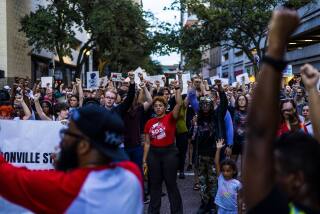Mississippi High Court Allows Suit Against Tobacco Firms
- Share via
Tobacco stocks plunged Thursday after Mississippi’s high court refused to dismiss a massive lawsuit there and a leading anti-tobacco lawyer released a potentially incriminating document in a Florida case.
The ruling by the Mississippi Supreme Court clears the way for the June 2 trial of a multibillion-dollar lawsuit in which Mississippi Atty. Gen. Mike Moore is seeking to recoup billions of dollars in Medicaid funds the state alleges were spent to treat indigent victims of smoking-related illnesses.
In the long-awaited ruling, the state’s high court refused to grant petitions by the tobacco companies and Mississippi Gov. Kirk Fordice that challenged Moore’s right to bring the case.
The industry had claimed that Mississippi’s chancery court in Pascagoula, where Moore filed the action, was an improper venue for the suit. Fordice, a Republican, had claimed that Moore, a Democrat, had no legal authority to bring the suit without approval of the governor.
The decisions, although technical in nature and not unexpected, resonated strongly because Mississippi in 1994 filed the first Medicaid suit, touching off the wave of nearly two dozen similar cases now facing the $50-billion industry. The June 2 trial will be the first for the Medicaid cases.
The stock market’s reaction to the ruling--which merely allows Mississippi’s case to proceed--is a dramatic illustration of investor nervousness regarding any news from the tobacco litigation front.
Shares in industry leader Philip Morris lost more than $9 billion in value, as the stock’s price closed down $12 at $126. RJR Nabisco stock closed down $2.875 at $33.25, and those of Loews Corp., parent of cigarette maker Lorillard, lost $6 to close at $104.375.
Moore called Thursday’s decision “a big victory” for the state, adding, “I don’t think there are any more legal hurdles left for us to jump before going to trial.”
However, industry executives voiced confidence that their side will prevail in court. “Mississippi ultimately cannot win this lawsuit,” said R.J. Reynolds, the No. 2 U.S. cigarette maker.
Shortly before the Mississippi ruling was announced, an anti-tobacco lawyer at a legal conference in Atlanta unveiled a 35-year-old internal memo. The action is related to the lung cancer case against R.J. Reynolds that is set for trial April 7 in Jacksonville, Fla.
The memo, by an R.J. Reynolds scientist, said: “Obviously the amount of evidence accumulated to indict cigarette smoke as a health hazard is overwhelming. The evidence challenging such an indictment is scant.”
The 25-page memo was written by Alan Rodgman of Reynolds’ chemical research division in 1962--two years before the release of the landmark Surgeon General’s report linking smoking and lung cancer, which Reynolds fiercely attacked.The memo also noted that extensive data developed by company researchers had remained unpublished.
“This raises an interesting question,” wrote Rodgman, now retired from RJR. If a tobacco company pleads “ ‘Not guilty’ or ‘Not proven’ to the charge that cigarette smoke” causes cancer, Rodgman wrote, can the company withhold data “because such data might affect adversely the company’s economic status when the company has already implied in its plea that no such [causal] effect exists?”
Reynolds executives said the Rodgman memo is neither new nor secret and that it has been produced in previous lawsuits. Moreover, they asserted that Rodgman was merely stating that most published research “suggested smoking posed health problems,” noting that he also said Reynolds need not accept such findings “at face value.”
The memo was disclosed by Norwood S. Wilner, a Jacksonville, Fla., lawyer who last August won a $750,000 verdict in a lung cancer case against Brown & Williamson Tobacco Corp.--the industry’s first loss ever if it stands on appeal. Wilner will attempt to use the Rodgman memo in the April 7 trial against Reynolds filed by the sister of a former smoker who died of lung cancer at age 50.
In a related development, it became clear that the civil damage suits filed by attorneys general across the country are generating revelations that may prove useful to the Justice Department’s criminal investigations of the cigarette firms.
In Minneapolis, a state court judge unsealed the transcript of a closed-door Feb. 18 hearing in which Jimmye Warren, the Justice Department lawyer who is spearheading federal grand jury inquiries of the tobacco industry, told the judge that she had met with plaintiffs’ attorneys there. According to the transcript, Warren said the department believes those attorneys, who have obtained more than 28 million pages of industry documents, “have some information which would be useful to us” in the criminal inquiry. Warren emphasized that because of federal grand jury secrecy laws, government lawyers would not be providing information to the plaintiffs.
More to Read
Sign up for Essential California
The most important California stories and recommendations in your inbox every morning.
You may occasionally receive promotional content from the Los Angeles Times.










